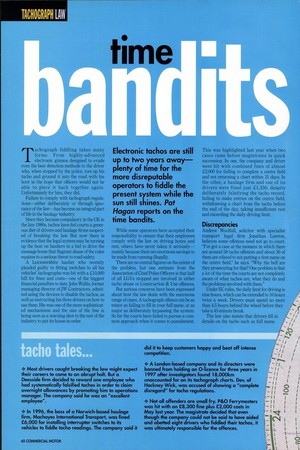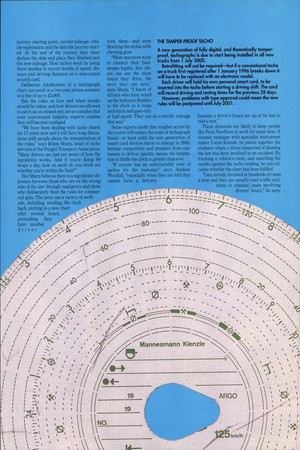Electronic tachos are still up to two years away— plenty
Page 42

Page 43

If you've noticed an error in this article please click here to report it so we can fix it.
of time for the more disreputable operators to fiddle the present system while the sun still shines. Pat Hagan reports on the time bandits. Tachograph fiddling any forms. From highly-advanced electronic gizmos designed to evade even the best detection methods to the driver who, when stopped by the police, tore up his tacho and ground it into the road with his boot in the hope that officers would not be able to piece it back together again. Unfortunately for him, they did.
Failure to comply with tachograph regulations—either deliberately or through ignorance of the law—has become an integral part of life in the haulage industry.
Since they became compulsory in the UK in the late 1980s, tachos have fed courts a generous diet of drivers and haulage firms suspected of breaking the law. But now there is evidence that the legal system may be turning up the heat on hauliers in a bid to drive the message home that flagrant abuse of the rules equates to a serious threat to road safety.
A Leicestershire haulier who recently pleaded guilty to fitting switches to all his vehicles' tachographs was hit with a £10,000 bill for fines and costs—one of the biggest financial penalties to date. John Wallis, former managing director of JW Contractors, admitted using the devices to disable the tachos, as well as instructing his three drivers on how to use them. His was one of the more sophisticated mechanisms and the size of the fine is being seen as a warning shot to the rest of the industry to put its house in order. While some operators have accepted their responsibility to ensure that their employees comply with the law on driving hours and rest, others have never taken it seriously— mainly because there are enormous savings to be made from running illegally.
There are no central figures on the extent of the problem, but one estimate from the Association of Chief Police Officers is that half of all LGVs stopped are involved in either tacho abuse or Construction & Use offences.
But serious concerns have been expressed about how the law deals with the enormous range of cases. A tachograph offence can be as minor as failing to fill in your full name, or as major as deliberately bypassing the system. So far the courts have failed to pursue a common approach when it comes to punishment. This was highlighted last year when two cases came before magistrates in quick succession. In one, the company and driver were hit with combined fines of almost £2,000 for failing to complete a centre field and not returning a chart within 21 days. In the other, a haulage firm and one of its drivers were fined just .£1,350, despite deliberately falsifying the tacho record, failing to make entries on the centre field, withdrawing a chart from the tacho before the end of the day, taking insufficient rest and exceeding the daily driving limit.
Discrepancies Andrew Woolfall, solicitor with specialist transport legal firm Jonathan Lawton, believes some offences need not go to court. "I've got a case at the moment in which there are around 58 tacho offences and about 30 of them are related to not putting a first name on the centre field," he says. "Why the hell are they prosecuting for that? One problem is that a lot of the time the courts are not completely aware of what tachos are, what they do and the problems involved with them."
Under EC rules, the daily limit for driving is nine hours, which can be extended to 10 hours twice a week. Drivers must spend no more than 4.5 hours behind the wheel before they take a 45-minute break.
The law also insists that drivers fill in details on the tacho such as full name, journey starting point, current mileage, vehicle registration and the date the journey started. At the end of the journey they must declare the date and place they finished and the new mileage. Most tachos work by using three needles to record details of speed, distance and driving duration on a wax-coated scratch card.
Deliberate falsification of a tachograph chart can result in a two-year prison sentence or a fine of up to £5,000.
But the rules on how and when breaks should be taken, and how drivers are allowed to catch up on missed rest, are so complex that even experienced industry experts confess they still become confused.
"We have been dealing with tacho charts for 17 years now and I still have long discussions with people about the interpretation of the rules," says Robin Sharp, head of tacho services at the Freight Transport Association. "Many drivers are just not aware of how the legislation works. And if you're doing 60 drops a day, how on earth do you work out whether you're within the limit?"
But Sharp believes there is a significant difference between those who are on the wrong side of the law through negligence and those who deliberately flout the rules for commercial gain. The latter use a variety of m ods, including winding the clock back, putting in a new chart t, after several hours, pretending they ‘ .........'" i % ,... „,,„ have another iiitp x ' k.S..- driver •.; ... ......... -".... , ..„ with them—and even blocking the stylus with chewing gum.
Some experts doubt that tougher action by the courts will reduce the scale of tachograph fraud—at least until the new generation of smart card devices starts to emerge in 2000. Intense competition and pressure from customers to deliver quickly means the temptation to fiddle the clock is greater than ever.
"If anyone has an unfavourable view of tachos it's the customer," says Andrew Woolfall, "especially when they are told they cannot have a delivery 7,1111 because a driver's hours are up or he has to take a rest."
These demands are likely to keep people like Peter Needham in work for some time. A forensic manager with specialist instrument maker Lucas Kienzle, he pieces together the evidence where a driver suspected of abusing the law has been involved in an accident. By tracking a vehicle's route, and matching the results against the tacho reading, he can calculate whether the chart has been fiddled.
"I am already involved in hundreds of cases a year and they are usually road traffic accidents or criminal cases involving 1-1 lilt drivers' hours," he says. THE TAMPER-PROOF TACHO A new generation of fully digital, and theoretically tamperproof, tachographs is due to start being installed in all new trucks from 1 July 2000. Retrofitting will not be required—but if a conventional tacho on a truck first registered after 1 January 1996 breaks down it will have to be replaced with an electronic model.
Each driver will hold his own personal smart card, to be inserted into the tacho before starting a driving shift. The card will record driving and resting times for the previous 28 days.
However, problems with type approval could mean the new rules will be postponed until July 2001.
• :• Most drivers caught breaking the law might expect their careers to come to an abrupt halt. But a Deesside firm decided to reward one employee who had systematically falsified tachos in order to claim overnight allowances by promoting him to operations manager. The company said he was an "excellent employee".
• :• In 1996, the boss of a Norwich-based haulage firm, Machayes International Transport, was fined £6,000 for installing interrupter switches to its vehicles to fiddle tacho readings. The company said it did it to keep customers happy and beat off intense competition.
A London-based company and its directors were banned from holding an 0-licence for three years in 1997 after investigators found 18,000km unaccounted for on its tachograph charts. Dev, of Hackney Wick, was accused of showing a "complete disregard" for tacho regulations.
• :• Not all offenders are small fry. P8,0 Ferrymasters was hit with an £8,300 fine plus £2,000 costs in May last year. The magistrate decided that even though the company could not be said to have aided and abetted eight drivers who fiddled their tachos, it was ultimately responsible for the offences.




































































































